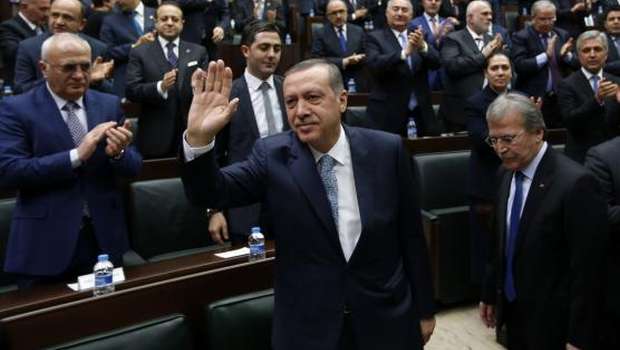Unfortunately, once again the Turkish government has fallen into the trap of overconfidence, not just in its domestic politics but also its foreign policy. The latest victory of the Justice and Development Party (AKP) in local elections has only contributed to the party and Prime Minister Recep Tayyip Erdoğan’s political delusion arising from overconfidence. After the latest victory, Erdoğan feels that his politics is vindicated on the principles that “might makes right.” Besides, he thinks that “might” in politics derives exclusively from majority support, and political legitimacy is solely based on the defeat of the opposition. In the circumstances, Erdoğan and his subservient government do not show any signs of changing course either in domestic or foreign policy, since they do not think that they need to.
From the beginning, the AKP’s foreign policy has been led by a version of neo-Ottomanism that combines Islamism, Ottoman nostalgia and irredentist Turkish nationalism. Nonetheless, it is only after Erdoğan became popular in the Middle East and began to consider himself a great Muslim leader that the neo-Ottoman vision of foreign policy started to affect major decisions. Besides, Erdoğan started to use his self-proclaimed regional leadership as a tool to manipulate domestic politics. Most recently, he used this tool to dismiss grave corruption investigations as “a grand conspiracy against the rising regional and global role of Turkey.” That is why Erdoğan addressed the Arab capitals and the Muslim world beyond during his election victory speech.
That is why, despite the fact that the AKP’s policy on Syria has not only failed but has also turned out to be a major disaster that has damaged relations between Turkey and its Western allies, the AKP still seems rather reluctant to revise its stance. Moreover, it seems that it is too late to change, since Turkey got heavily involved in regime change in Syria and went as far as to side with the opposition in the Syrian conflict. Besides, the Turkish government still tries to control Kurdish affairs and to limit Kurdish gains in Syria, despite its promises to end its activities in the Kurdish region in Syria within the framework of the so-called Kurdish peace process and negotiations with Kurdistan Workers’ Party (PKK) leader Abdullah Öcalan. The Kurds are accusing the Turkish government of continuing to support the Islamic State of Iraq and Syria (ISIS)—which began as an Al-Qaeda affiliate—against the PKK-affiliated Syrian–Kurdish Democratic Union Party (PYD), and using border towns such as Ceylanpınar as logistic centers. That is why the Kurdish Peace and Democracy Party (BDP) accused the governing party of rigging the elections for the mayor of Ceylanpınar.
Turkey’s foreign politics concerning Egypt are not moving in a better direction either. Although the military’s intervention against former Egyptian president Mohamed Mursi was an assault on democracy in the eyes of many, we cannot dismiss the fact that the Turkish government’s reaction has been scandalous, as it turned out to be meddling in Egypt’s domestic politics. The Turkish government has confused criticism based on principles and governmental engagement with political action in another country. The Turkish government went so far as to project perceptions of its own meddling onto others and accused regional countries and Western powers of supporting the Egyptian coup, refusing to acknowledge the realpolitik-based concerns of others. Nevertheless, the Turkish government has not expressed any willingness to seriously revise its foreign policy concerning Egypt and elsewhere, especially now it feels more confident following Turkey’s recent local elections.
This is because the local elections were in fact not only another set of local elections, but turned out to be a referendum on the governing party and its leader Erdoğan. In fact, Erdoğan, who considers himself the leader of the Muslim world, thinks his leadership has been approved once more, not only by the Turkish electorate, but also by the “prayers of Muslims all over the world,” as he puts it. So why would he change his foreign policy, rather than try to change the world. This is the mindset of Erdoğan and his followers. God help Turkey!
The counterpoint to this article can be read here.
